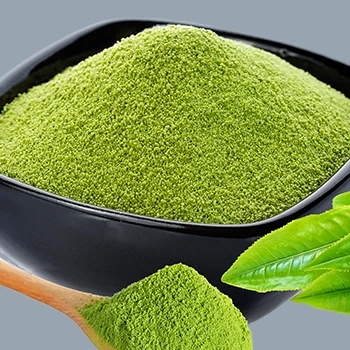Green tea antioxidants are known for their many health benefits, including their ability to increase testosterone levels.
To help you understand the correlation between green tea and testosterone and learn how to use it to improve your own hormone balance, I teamed up with our nutritionist and pored through hundreds of research.
Here is what we found.
Quick Summary
- Green tea extract, rich in anti-inflammatory and antioxidant compounds, may help boost testosterone levels, offering potential benefits for men with low testosterone.
- Regular consumption of green tea can lead to sexual health benefits, improved liver function, and enhanced immune response.
- A study published in PubMed Central suggests that green tea's EGCG component could decrease serum testosterone levels after twenty-six days of treatment, indicating mixed results in research.
- Personally, as a coach, I've observed varied responses in clients using green tea for testosterone enhancement, underscoring the need for individualized approaches and further research.
Does Green Tea Extract Aid in Testosterone Production?

Green tea extract may aid in testosterone production due to the presence of flavonoids – catechins believed to benefit healthy testosterone levels [1].
In my coaching experience, I've observed clients who incorporated green tea extract into their routine often report improved energy and vitality.
However, other research revealed inconclusive results.
Its essential chemical components are L-theanine, potassium, iron, calcium, caffeine, and green tea epigallocatechin gallate (EGCG).
Some studies have shown that EGCG, a type of green tea extract catechins, can suppress estrogen, also known as the female hormone.
Reduced estrogen could increase testosterone levels as estrogen excess can negatively impact male sexual development, testis function, and sperm production [2,3].
In addition, green tea extracts are believed to elevate sex hormone binding globulin (SHBG), a necessary protein that, in turn, may cause androgen activity [4].
However, another study published in PubMed Central revealed that EGCG in green tea leaf extract actually decreased serum testosterone levels after twenty-six days of treatment [5].
According to research findings from PMC, regular consumption of green tea is not only safe but potentially beneficial for reproductive health, as well as liver and kidney functions, in male rats, suggesting similar positive implications for human health [6].
As of now, more research is necessary in order to gain more consistent results and determine the effect of green tea on testosterone production.
Related: Does Almond Milk Boost Testosterone?
What Are the Key Benefits of Green Tea for Men with Low T?

From my personal use and coaching others, I've seen green tea's benefits firsthand in men with low T.
It's not just about preventing cell damage and maintaining liver function; it's about feeling more energetic and resilient, which is crucial for those dealing with low testosterone.
Let’s go into more detail about each benefit:
- Preventing cell damage – Green tea contains anti-inflammatory compounds that can help protect Leydig cells and increase the efficiency with which they release testosterone [7].
- Maintaining healthy liver function – Green tea leaves contain antioxidants, which can stimulate your body’s antioxidant enzymes in the liver, small intestine, and lungs [8]. Supporting healthy liver function results in more stable testosterone levels as the liver breaks down hormones.
- Boosting the immune system – Green tea catechins boost the immune system, eliminate specific bacteria and viruses, fight inflammation, and control hormone production [9]. With that in mind, research has shown that when inflammation occurs, adipose tissue converts testosterone into estradiol [10].
- Improving fertility – Drinking green tea extracts have been proven to improve sperm parameters, fertility, and overall reproductive function [11,12].
“Green tea has a range of possible health benefits. To help you feel better, lose weight, and lower your risk of chronic diseases, you may want to consider making green tea a regular part of your life.”
- Kris Gunnars, Bachelor of Medicine & Editor at Healthline.com
What Are the Side Effects of Drinking Green Tea?

Speaking from experience, while green tea is generally beneficial, I've had clients who experienced side effects like irritability and sleeplessness, especially when consumed in large amounts. It's a reminder that moderation is key.
People who are sensitive to caffeine and tannins are more likely to experience these negative consequences [13].
That said, if you’re looking to increase your hormone levels naturally, I would recommend combining solid training and a balanced diet with a high-quality T booster.
Keep in mind that green tea acts as a natural diuretic, so excessive consumption may cause dehydration.
To avoid side effects, it's best to limit green tea intake to a maximum of sixteen cups per day.
Additionally, for those sensitive to caffeine, consider avoiding green tea at least five hours before bedtime to ensure it doesn't disrupt your sleep.
FAQs
Can Green Tea Increase Testosterone?
Yes, green tea can increase testosterone due to its ability to reduce estrogen levels, according to some research. However, more research is needed to undoubtedly determine whether or not green tea has a positive impact on testosterone.
Can Green Tea Reduce Insulin Resistance?
Yes, green tea can reduce insulin resistance, which has been associated with decreased testosterone in Leydig cells [14]. According to research published in PubMed, green tea appears to help people with diabetes regulate their blood sugar and lower fasting insulin levels, fasting glucose, and A1C [15].
Are Green Tea Polyphenols Safe?
Yes, green tea polyphenols are safe when not exceeding 8 cups of green tea a day. In addition, drinking green tea continually for up to four weeks is safe for healthy people [16].
References:
- https://www.mdpi.com/2076-3921/9/3/237
- https://www.ncbi.nlm.nih.gov/pmc/articles/PMC4691479/
- https://www.ncbi.nlm.nih.gov/books/NBK278933/
- https://pubmed.ncbi.nlm.nih.gov/9507508/
- https://www.ncbi.nlm.nih.gov/pmc/articles/PMC4788727/
- https://www.ncbi.nlm.nih.gov/pmc/articles/PMC7498455/
- https://www.ncbi.nlm.nih.gov/pmc/articles/PMC6653493/
- https://pubmed.ncbi.nlm.nih.gov/32943691/
- https://www.sciencedirect.com/science/article/pii/S2213453022000465
- https://www.frontiersin.org/journals/endocrinology/articles/10.3389/fendo.2022.974773/full
- https://www.webmd.com/vitamins/ai/ingredientmono-960/green-tea
- https://www.ncbi.nlm.nih.gov/pmc/articles/PMC6073549/
- https://www.webmd.com/vitamins/ai/ingredientmono-960/green-tea
- https://academic.oup.com/jcem/article/90/5/2636/2836773
- https://pubmed.ncbi.nlm.nih.gov/23803878/
- https://pubmed.ncbi.nlm.nih.gov/12960117/
About The Author
You May Also Like






